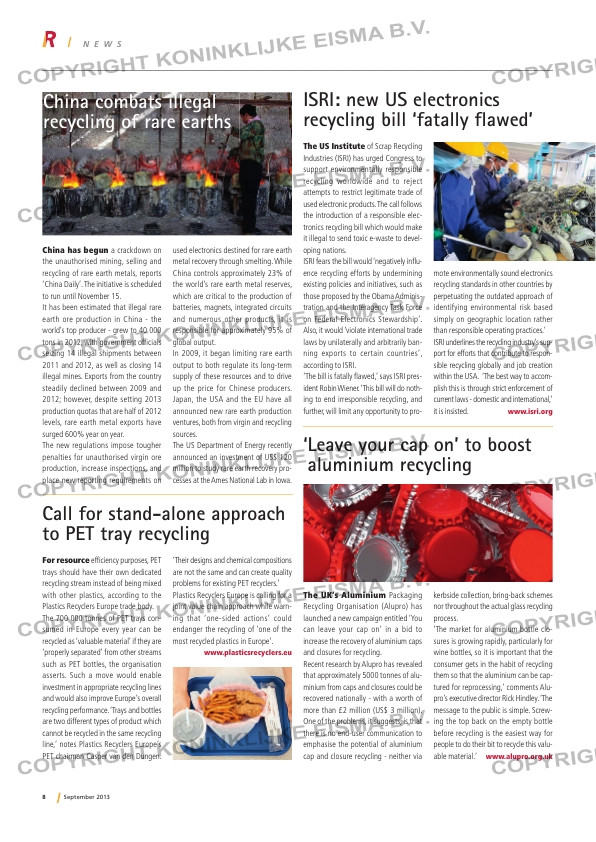Page 8 from: September 2013

8 September 2013
N E W S
China has begun a crackdown on
the unauthorised mining, selling and
recycling of rare earth metals, reports
‘China Daily’. The initiative is scheduled
to run until November 15.
It has been estimated that illegal rare
earth ore production in China – the
world’s top producer – grew to 40 000
tons in 2012, with government offi cials
seizing 14 illegal shipments between
2011 and 2012, as well as closing 14
illegal mines. Exports from the country
steadily declined between 2009 and
2012; however, despite setting 2013
production quotas that are half of 2012
levels, rare earth metal exports have
surged 600% year on year.
The new regulations impose tougher
penalties for unauthorised virgin ore
production, increase inspections, and
place new reporting requirements on
used electronics destined for rare earth
metal recovery through smelting. While
China controls approximately 23% of
the world’s rare earth metal reserves,
which are critical to the production of
batteries, magnets, integrated circuits
and numerous other products, it is
responsible for approximately 95% of
global output.
In 2009, it began limiting rare earth
output to both regulate its long-term
supply of these resources and to drive
up the price for Chinese producers.
Japan, the USA and the EU have all
announced new rare earth production
ventures, both from virgin and recycling
sources.
The US Department of Energy recently
announced an investment of US$ 120
million to study rare earth recovery pro-
cesses at the Ames National Lab in Iowa.
China combats illegal
recycling of rare earths
The UK’s Aluminium Packaging
Recycling Organisation (Alupro) has
launched a new campaign entitled ‘You
can leave your cap on’ in a bid to
increase the recovery of aluminium caps
and closures for recycling.
Recent research by Alupro has revealed
that approximately 5000 tonnes of alu-
minium from caps and closures could be
recovered nationally – with a worth of
more than £2 million (US$ 3 million).
One of the problems, it suggests, is that
there is no end-user communication to
emphasise the potential of aluminium
cap and closure recycling – neither via
kerbside collection, bring-back schemes
nor throughout the actual glass recycling
process.
‘The market for aluminium bottle clo-
sures is growing rapidly, particularly for
wine bottles, so it is important that the
consumer gets in the habit of recycling
them so that the aluminium can be cap-
tured for reprocessing,’ comments Alu-
pro’s executive director Rick Hindley. ‘The
message to the public is simple. Screw-
ing the top back on the empty bottle
before recycling is the easiest way for
people to do their bit to recycle this valu-
able material.’ www.alupro.org.uk
‘ Leave your cap on’ to boost
aluminium recycling
The US Institute of Scrap Recycling
Industries (ISRI) has urged Congress to
support environmentally responsible
recycling worldwide and to reject
attempts to restrict legitimate trade of
used electronic products. The call follows
the introduction of a responsible elec-
tronics recycling bill which would make
it illegal to send toxic e-waste to devel-
oping nations.
ISRI fears the bill would ‘negatively infl u-
ence recycling efforts by undermining
existing policies and initiatives, such as
those proposed by the Obama Adminis-
tration and the Interagency Task Force
on Federal Electronics Stewardship’.
Also, it would ‘violate international trade
laws by unilaterally and arbitrarily ban-
ning exports to certain countries’,
according to ISRI.
‘The bill is fatally fl awed,’ says ISRI pres-
ident Robin Wiener. ‘This bill will do noth-
ing to end irresponsible recycling, and
further, will limit any opportunity to pro-
mote environmentally sound electronics
recycling standards in other countries by
perpetuating the outdated approach of
identifying environmental risk based
simply on geographic location rather
than responsible operating practices.’
ISRI underlines the recycling industry’s sup-
port for efforts that contribute to respon-
sible recycling globally and job creation
within the USA. ‘The best way to accom-
plish this is through strict enforcement of
current laws – domestic and international,’
it is insisted. www.isri.org
ISRI: new US electronics
recycling bill ‘fatally flawed’
For resource effi ciency purposes, PET
trays should have their own dedicated
recycling stream instead of being mixed
with other plastics, according to the
Plastics Recyclers Europe trade body.
The 700 000 tonnes of PET trays con-
sumed in Europe every year can be
recycled as ‘valuable material’ if they are
‘properly separated’ from other streams
such as PET bottles, the organisation
asserts. Such a move would enable
investment in appropriate recycling lines
and would also improve Europe’s overall
recycling performance. ‘Trays and bottles
are two different types of product which
cannot be recycled in the same recycling
line,’ notes Plastics Recyclers Europe’s
PET chairman Casper van den Dungen.
‘Their designs and chemical compositions
are not the same and can create quality
problems for existing PET recyclers.’
Plastics Recyclers Europe is calling for a
joint value chain approach while warn-
ing that ‘one-sided actions’ could
endanger the recycling of ‘one of the
most recycled plastics in Europe’.
www.plasticsrecyclers.eu
Call for stand-alone approach
to PET tray recycling
p08_NEWS.indd 8 02-09-13 16:58



